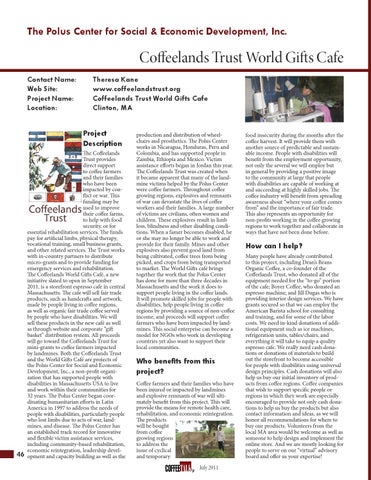The Polus Center for Social & Economic Development, Inc.
Coffeelands Trust World Gifts Cafe Contact Name: Web Site: Project Name: Location:
Theresa Kane www.coffeelandstrust.org Coffeelands Trust World Gifts Cafe Clinton, MA
Project Description
46
The Coffeelands Trust provides direct support to coffee farmers and their families who have been impacted by conflict or war. This funding may be used to improve their coffee farms, to help with food security, or for essential rehabilitation services. The funds pay for artificial limbs, physical therapy, vocational training, small business grants, and other related services. The Trust works with in-country partners to distribute micro-grants and to provide funding for emergency services and rehabilitation. The Coffeelands World Gifts Café, a new initiative slated to open in September 2011, is a storefront espresso cafe in central Massachusetts. The cafe will sell fair trade products, such as handcrafts and artwork, made by people living in coffee regions, as well as organic fair trade coffee served by people who have disabilities. We will sell these products in the new café as well as through website and corporate “gift basket” distribution system. All proceeds will go toward the Coffeelands Trust for mini-grants to coffee farmers impacted by landmines. Both the Coffeelands Trust and the World Gifts Café are projects of the Polus Center for Social and Economic Development, Inc., a non-profit organization that has supported people with disabilities in Massachusetts USA to live and work within their communities for 32 years. The Polus Center began coordinating humanitarian efforts in Latin America in 1997 to address the needs of people with disabilities, particularly people who lost limbs due to acts of war, landmines, and disease. The Polus Center has an established track record for innovative and flexible victim assistance services, including community-based rehabilitation, economic reintegration, leadership development and capacity building as well as the
production and distribution of wheelchairs and prosthetics. The Polus Center works in Nicaragua, Honduras, Peru and Colombia, and has supported people in Zambia, Ethiopia and Mexico. Victim assistance efforts began in Jordan this year. The Coffeelands Trust was created when it became apparent that many of the landmine victims helped by the Polus Center were coffee farmers. Throughout coffee growing regions, explosives and remnants of war can devastate the lives of coffee workers and their families. A large number of victims are civilians, often women and children. These explosives result in limb loss, blindness and other disabling conditions. When a famer becomes disabled, he or she may no longer be able to work and provide for their family. Mines and other explosives also prevent good land from being cultivated, coffee trees from being picked, and crops from being transported to market. The World Gifts café brings together the work that the Polus Center has done for more than three decades in Massachusetts and the work it does to support people living in the coffee lands. It will promote skilled jobs for people with disabilities, help people living in coffee regions by providing a source of non-coffee income, and proceeds will support coffee farmers who have been impacted by landmines. This social enterprise can become a model for NGOs who work in developing countries yet also want to support their local communities.
Who benefits from this project? Coffee farmers and their families who have been injured or impacted by landmines and explosive remnants of war will ultimately benefit from this project. This will provide the means for remote health care, rehabilitation, and economic reintegration. The products will be bought from coffee growing regions to address the issue of cyclical and temporary July 2011
food insecurity during the months after the coffee harvest. It will provide them with another source of predictable and sustainable income. People with disabilities will benefit from the employment opportunity, not only the several we will employ but in general by providing a positive image to the community at large that people with disabilities are capable of working at and succeeding at highly skilled jobs. The coffee industry will benefit from spreading awareness about “where your coffee comes from” and the importance of fair trade. This also represents an opportunity for non-profits working in the coffee growing regions to work together and collaborate in ways that have not been done before.
How can I help? Many people have already contributed to this project, including Dean’s Beans Organic Coffee, a co-founder of the Coffeelands Trust, who donated all of the equipment needed for the “to-go” portion of the cafe; Boyer Coffee, who donated an espresso machine; and Jill Dugas who is providing interior design services. We have grants secured so that we can employ the American Barista school for consulting and training, and for some of the labor costs. We need in-kind donations of additional equipment such as ice machines, refrigeration units, tables/chairs, and everything it will take to equip a quality espresso cafe. We really need cash donations or donations of materials to build out the storefront to become accessible for people with disabilities using universal design principles. Cash donations will also help us buy our initial inventory of products from coffee regions. Coffee companies that wish to support specific people or regions in which they work are especially encouraged to provide not only cash donations to help us buy the products but also contact information and ideas, as we will honor all recommendations for where to buy our products. Volunteers from the local MA area would be welcome as well as someone to help design and implement the online store. And we are mostly looking for people to serve on our “virtual” advisory board and offer us your expertise!
